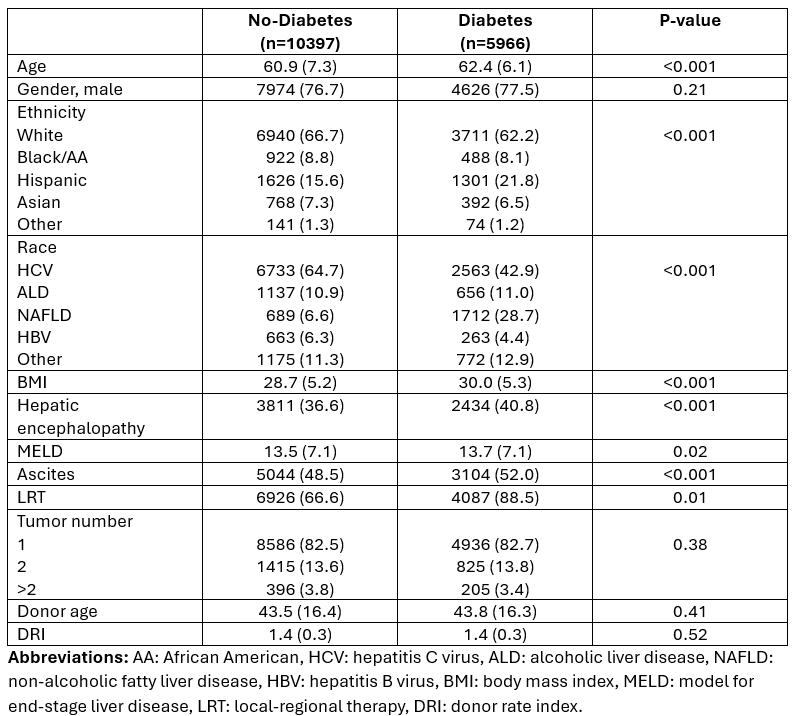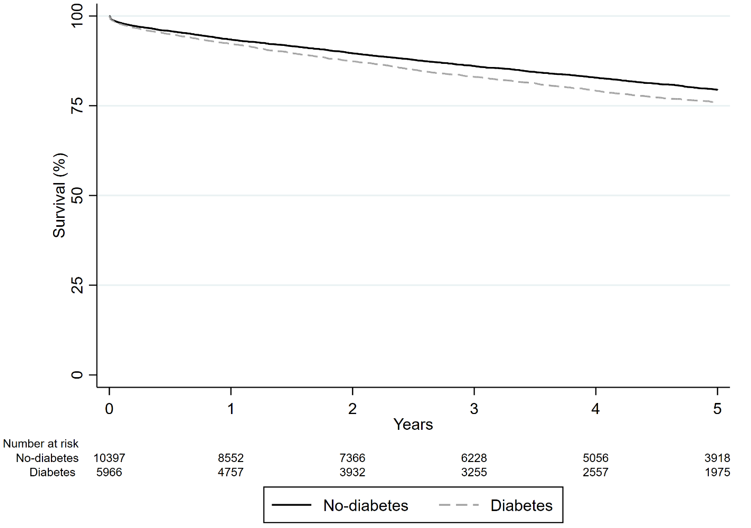Diabetes is associated with higher mortality in liver transplant recipients with hepatocellular carcinoma
Marwan Elsaqa1, Leandro Sierra Carrero1, Alan Bonder1, Behnam Saberi1.
1Gastroenterology and Hepatology, Beth Israel Deaconess Medical Center, Boston, MA, United States
Introduction: Liver transplant is one of the main treatment options for patients with hepatocellular carcinoma. Diabetes may exacerbate outcomes in liver transplant recipients through various mechanisms, whether involving microvascular or macrovascular complications. In this study, we aim to investigate the effect of diabetes on post-LT survival in patients with HCC.
Methods: We conducted a retrospective analysis utilizing the United Network for Organ Sharing UNOS/OPTN database, assessing hepatocellular carcinoma (HCC) patients who underwent deceased donor liver transplantation (LT) from January 2013 to December 2022. To assess survival outcomes, we employed the Kaplan-Meier method. To identify significant predictors of survival, we performed a forward univariate and a stepwise multivariate Cox regression analysis, adjusted for both recipient and donor characteristics.
Results: We analyzed a total of 16363 HCC patients who underwent LT between Jan 2013 to December 2022. Among these 5966 (36.4%) patients had diagnostic codes for diabetes. The clinical characteristics of the two groups are shown in Table 1. Patients in the diabetic group were older and had higher BMI. The proportion of patients with MASLD was higher in the diabetic group (28.7% vs 6.6%). Survival in non-diabetic patients at 1, 3, and 5 years were 93.4%, 86.0%, and 79.4%, respectively; compared to diabetic group at 1, 3, and 5 years of 92.2%, 83.0%, and 75.9%, respectively (Figure 1). In univariate analysis, diabetes was associated with a higher hazard of mortality (HR=1.293, 95% CI 1.207-1.385). In the multivariate analysis, recipient age, race, pre-transplant dialysis, AFP, tumor number were associated with higher hazard of mortality. In addition, diabetes was associated with higher mortality (HR 1.210, 95% CI 1.128-1.297).
Conclusion: Diabetes affects post-LT outcomes in patients with HCC. Pre- and post-LT diagnosis and management of diabetes is essential in improving patient outcomes in LT recipients with HCC.


[1] Post-transplant Patient Survival
[2] Diabetes Mellitus
[3] Metabolic-associated Steatotic Liver Disease
[4] Hepatocellular Carcinoma
[5] Liver transplant
